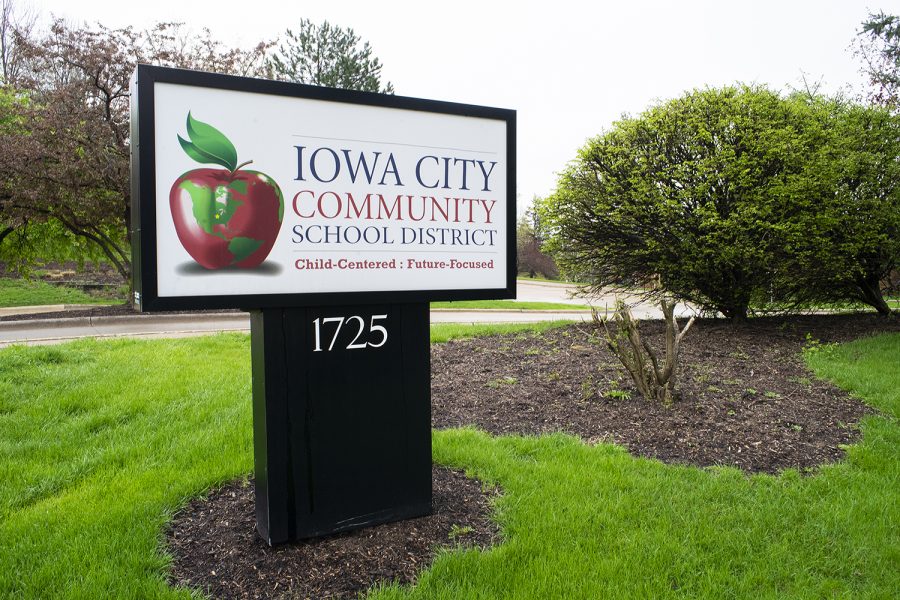Parents help kids learn from home as school closures are extended
As schools in Iowa continue to remain closed until April 30, an Iowa City parent tries to help her children stay on top of their classwork — even though she’s not required to do so.
The Iowa City Community School District sign is seen on April 29, 2019.
April 2, 2020
Sharon DeGraw pulled her children — a fourth grader at Regina Elementary School and a seventh grader at Southeast Junior High School — out of school a few days before spring break began March 16. She wanted to prevent the spread of the novel coronavirus and anticipated schools closing.
“It’s the first time in their life that they’re beginning to understand that something very serious is happening,” DeGraw said.
With children spending the past seven months at school five days a week, seeing their peers and teachers every day, the transition to being home all the time is a shift that DeGraw, an Iowa City parent, has found demands more responsibility from students.
Now that her children are home, DeGraw said they try to “wiggle out” of doing classwork if possible. This requires her to ensure that her seventh grader is learning the correct level of math on Khan Academy, an online learning platform, and turn off the internet when necessary, so the kids do not play video games instead of reading.
“I have to tell my oldest that [doing schoolwork] — is not optional for us. You need to be doing this,” DeGraw said. “There’s different philosophies — some people think it’s a stressful time and that kids shouldn’t be pushed. But I’m actually finding that the more structure we have, the more predictable my kid’s behavior is.”
DeGraw has discovered she needs to research the curriculum for her seventh grader to make sure he’s doing what he needs to be, because as work isn’t required by the district. Some of his teachers have been in contact with her, DeGraw said, but students are not obligated to complete work so she hasn’t connected with every teacher.
If classes move to an online format, or if students have makeup work to complete in the summer, DeGraw said she would be fine if that means keeping the community safe.
In a news conference April 2, Iowa Gov. Kim Reynolds extended school closures in Iowa until April 30. At this time, she isn’t recommending schools close for the remainder of the year. Iowa City schools were set to end the schoolyear May 29.
RELATED: Iowa’s K-12 schools prepare for potential move to online learning
“Keeping students out of classrooms is a very difficult decision, but it remains necessary for now,” Reynolds said.
The number of COVID-19 cases is expected to pedal upward, so keeping schools closed will protect students, educators, and those vulnerable to the virus, helping to flatten the curve and ultimately save lives, she said.
Schools in the state can offer voluntary or required classwork to students as continuous learning options, said Department of Education Director Ann Lebo at the news conference.
Through the voluntary option, schools can encourage — but not require — students to do classwork, Lebo said. Attendance is taken and work would be graded if schools choose the required option, she added.
Public schools and accredited private schools must indicate to the state Department of Education which method of continuous education they plan to use through April 13-30, she said. The deadline to report that method is April 10.
“During these unprecedented times, we remain focused on supporting our schools, families, and community partners to ensure Iowa learners are safe, healthy, engaged, and prepared,” Lebo said.
After school buildings closed their doors in March, district administrators began preparing to help students get access to technology, classwork resources, and meal services.
Faculty and staff in the Iowa City Community School District have worked under the presumption that school would be back in session this month, but also planned for the possibility it may not happen, said Superintendent Stephen Murley.
The district created two sets of instructional support for students and parents — one will include supplementary resources and the other is to go into online instruction, Murley said.
The supplemental-instruction resources are essentially a resource bank, he said. The resources are broken down by curricular areas and grade levels. Some of the resources are more broad, like for high schoolers, and other resources, like those for kindergarteners, are broken down into concrete areas such as English, science, math, social studies, art, and physical education, he said.
The goal is to provide parents with a set of resources to help their kids, Murley said. For advanced placement courses, there are tutorials and study guides for students to prepare for AP assessments, he added, which will be online this year.
Families can pick up meals at various locations across Johnson County. Wireless internet hotspots are also available for parents to pick up if they lack an internet connection and students can access Chromebooks if they don’t own a computer at home, Murley said.
“We’ve got a lot of instructors who are used to teaching face-to-face, so teaching in a virtual environment is a brave new world for them,” Murley said. “So, they are learning how to navigate that, and we have a lot of kids that have never taken online classes, so this is a brand-new environment for them.”



